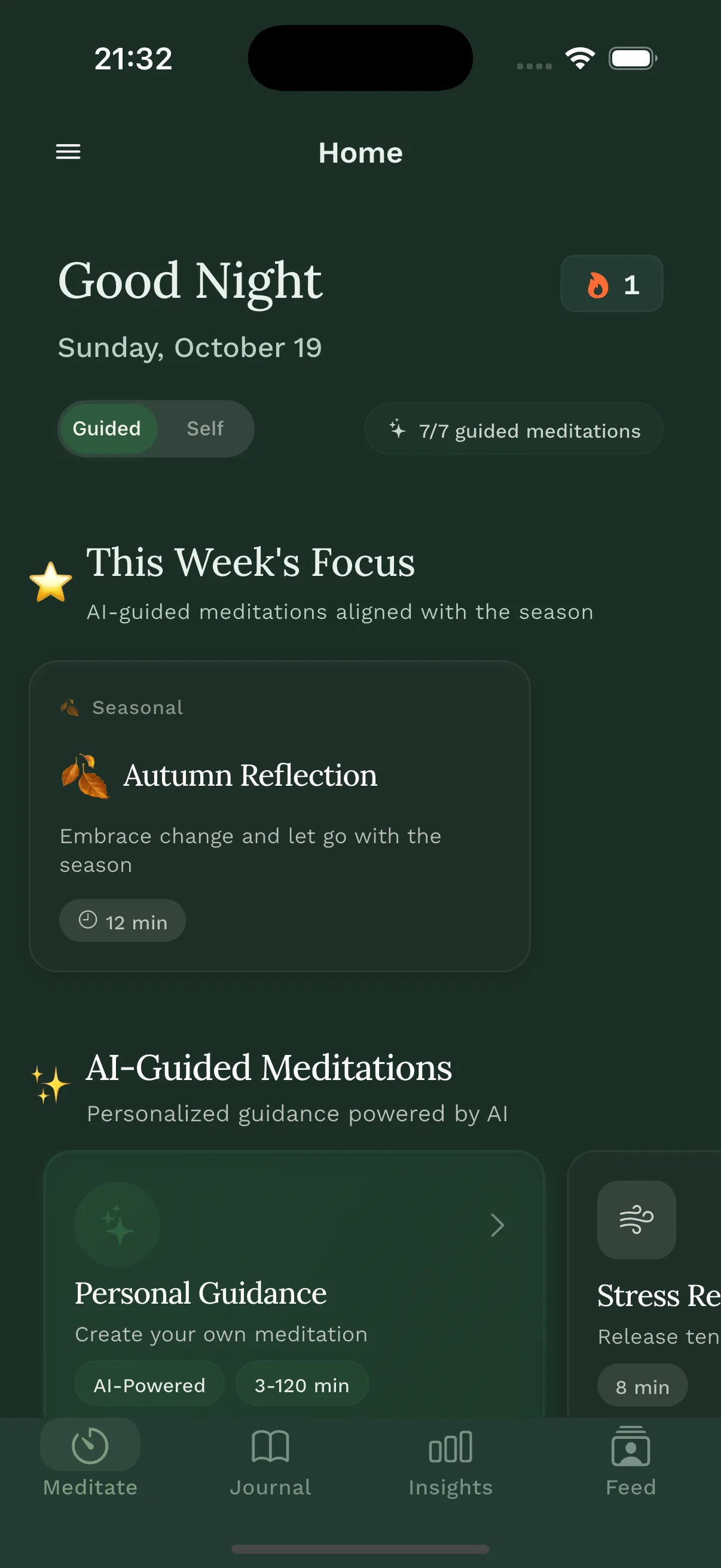

Meditation for Insomnia
For being awake at 3am, not feeling sleepy. AI guided meditation that works with sleep anxiety and racing thoughts, not against them.

AI guided meditation that works with sleep anxiety and racing thoughts, not against them. No sleep hygiene lectures. No promises that relaxation equals sleep. Just honest support for chronic insomnia, middle of the night wake-ups, and the meta-anxiety of worrying about not sleeping.
Medical Disclaimer: This meditation app is not medical treatment for insomnia. Chronic insomnia (3+ nights per week for 3+ months) may require CBT-I therapy, sleep studies, or medication. Meditation complements medical care, it doesn't replace it. Talk to a sleep specialist or doctor about persistent sleep problems.
Types of Insomnia (Which One Are You?)
Sleep Onset Insomnia
Can't fall asleep initially. Lying in bed for 1 to 3 hours with racing thoughts about tomorrow.
Meditation Approach: Pre-bed sessions for anticipatory anxiety and thought racing. Short (2 to 5 min) sessions when lying awake gets frustrating.
Sleep Maintenance Insomnia
The classic 2am or 3am wake-up. Can't get back to sleep. Watching the clock tick toward morning.
Meditation Approach: Middle of the night sessions for being awake with less panic. Focus on reducing meta-anxiety about lost sleep.
Early Morning Insomnia
Waking at 4am or 5am and staying awake. Sleep feels done even though you're exhausted.
Meditation Approach: Early morning sessions acknowledging sleep might be over. Reducing rumination and morning anxiety.
Mixed Insomnia
Combination of sleep onset, maintenance, and early waking. The full insomnia experience.
Meditation Approach: AI adapts to what's happening right now. Different sessions for different parts of the night.
How to Use Meditation for Insomnia
Tell AI About Your Sleep Struggle
Tap 'AI Guided Meditation' and describe what you're experiencing. Example: 'I've been awake since 2:47am. Work presentation tomorrow. Calculating hours of sleep left and getting more anxious.' The AI creates insomnia-specific meditation for you.
Choose Your Duration (2-15 Minutes)
Pick what feels manageable when you're frustrated and sleep-deprived. 2-5 minutes for intense anxiety. 10-15 minutes if you can sustain focus. Short sessions often work better than long ones.
Practice Without Expectations
Goal isn't 'meditate and you'll fall asleep.' That's toxic positivity. Goal is reducing the panic of being awake. Sometimes meditation helps you sleep. Sometimes it doesn't. Both outcomes are okay.
Track Patterns for Your Doctor
Use <a href='/voice-journal/'>voice notes</a> to track sleep patterns, triggers, what helps vs what doesn't. Build data for your sleep specialist. Pattern tracking is part of CBT-I therapy.
How StillMind Works With Insomnia
For Being Awake, Not Forcing Sleep
Sessions focus on reducing the panic and racing thoughts of being awake. No guarantees you'll fall asleep. That's honest.
2 to 15 Minute Sessions
Short sessions when you're frustrated and sleep-deprived. Longer sessions if you want them. You're in control.
Meta-Anxiety Support
Acknowledges worrying about not sleeping. Addresses the anxiety about tomorrow's exhaustion. That's real.
No Sleep Hygiene Lectures
You already know about blue light, caffeine, and sleep schedules. We're not repeating that. This is for chronic insomnia.
Voice Journal Integration
Track sleep patterns, triggers, and what actually helps. Voice notes when you're too tired to type. Data for your doctor.
AI Adapts to Insomnia Type
Different approach for sleep onset vs 3am wake-ups vs early morning insomnia. Adapts based on what you're experiencing.
Real Insomnia Scenarios
Meditation sessions designed for specific sleep struggles, not generic "drift off peacefully" promises.
3am Wake-Up Panic
Wide awake at 2:47am. Work presentation tomorrow. Watching the clock tick. Calculating hours of sleep left. Meta-anxiety mounting.
Sleep maintenance insomnia is real. The panic of being awake makes it worse. Racing thoughts about tomorrow's exhaustion are normal.
Meditation for being awake right now. Reducing clock-watching anxiety. Acknowledging sleep might not happen. Lowering panic so rest is possible even without sleep.
Pre-Bed Racing Thoughts
Lying in bed for 90 minutes. Mind replaying work conversations. Planning tomorrow. Worrying about not falling asleep. Getting more awake.
Sleep onset insomnia feeds on anticipatory anxiety. The harder you try to sleep, the more awake you feel. That's the paradox.
Short sessions to interrupt thought loops. Acknowledging tomorrow's worries without solving them at midnight. Permission to be awake without panic.
4am Final Wake-Up
Awake at 4:23am. Sleep feels done. Alarm set for 6:30am. Ruminating about life. Too tired to get up, too awake to sleep.
Early morning insomnia is common with depression and chronic stress. The rumination hour. Sleep pressure is low, anxiety is high.
Early morning sessions for rumination reduction. Accepting sleep might be over. Reducing the distress of early waking. Making the hours until alarm less agonizing.
Menopause Night Sweats
Hot flash at 1:30am. Soaked sheets. Wide awake from temperature spike. Hormone rage. Knowing you won't fall back asleep easily.
Perimenopause and menopause cause sleep maintenance insomnia in 61% of women. Hormonal sleep disruption is biochemical, not in your head.
Post-hot flash sessions for temperature dysregulation stress. Acknowledging hormone-caused insomnia. Link to menopause meditation guide for symptom-specific support.
Sunday Night Insomnia
Can't sleep Sunday night. Dreading Monday. Anticipatory work anxiety. Watching sleep window close. Knowing tomorrow will be exhausting.
Anticipatory anxiety about the work week prevents sleep onset. The Sunday Scaries are real. Work stress bleeds into sleep.
Pre-work week sessions for anticipatory anxiety. Acknowledging work dread is valid. Meditation won't fix toxic jobs but can lower Sunday night panic. Link to burnout meditation for ongoing work stress.
Chronic Pain Night Waking
Waking from pain at 3am. Can't find comfortable position. Pain levels higher at night. Sleep disrupted by physical discomfort.
Chronic pain causes sleep maintenance insomnia. Pain and sleep have bidirectional relationship. Poor sleep increases pain sensitivity.
Middle of the night sessions for pain-related waking. Acknowledging pain is preventing sleep. Meditation complements pain management. Link to chronic pain meditation for pain-specific techniques.
The Insomnia Reality
Higher insomnia rates in women vs men, linked to hormonal changes, menopause, caregiving stress, and anxiety disorders.
Of adults experience short-term insomnia. 10% have chronic insomnia (3+ months). That's millions of people awake at 3am.
Cognitive Behavioral Therapy for Insomnia is the gold standard treatment. Meditation is a complement, not a replacement.
Insomnia Meditation Questions
Can meditation help with chronic insomnia or will it just make me more frustrated?
Traditional meditation that tells you to "clear your mind" at 3am can absolutely make insomnia worse. That's not what this is. StillMind's AI guided meditation for insomnia focuses on working with being awake, not forcing yourself to sleep. Sessions acknowledge racing thoughts, sleep anxiety, and the meta-anxiety of worrying about not sleeping.
Women report 42.1% higher insomnia rates than men, often linked to hormonal changes, menopause, and caregiving stress. Meditation won't cure chronic insomnia (some people need medical intervention, CBT-I therapy, or medication), but it can help reduce the panic and racing thoughts that make sleepless nights worse.
The goal isn't "relax and you'll fall asleep" toxic positivity. It's surviving 3am with less distress.
What's the difference between sleep onset, sleep maintenance, and early morning insomnia?
Sleep onset insomnia means you can't fall asleep initially (lying in bed for hours). Sleep maintenance insomnia means you wake up during the night and can't get back to sleep (the 2am or 3am wake-up). Early morning insomnia means waking at 4am or 5am and staying awake. Mixed insomnia combines multiple types.
Each type has different triggers. Sleep onset often involves racing thoughts about tomorrow. Sleep maintenance can be linked to anxiety, hormonal changes, or pain. Early morning insomnia is common with depression and stress.
StillMind's meditation adapts to what you're experiencing right now, whether that's pre-sleep anxiety, middle of the night panic, or early morning rumination.
I've tried sleep meditations before and they just make me angry. How is this different?
Sleep meditations that promise "you'll drift off peacefully" set you up for failure when you're lying there wide awake 45 minutes later. That's not how chronic insomnia works.
StillMind's approach is honest: sometimes you won't fall asleep. Sometimes meditation won't help tonight. That's insomnia, not your fault. The sessions focus on reducing the panic of being awake, not guaranteeing sleep.
No sleep hygiene lectures about blue light and caffeine (you already know). No promises that relaxation equals sleep (it doesn't for chronic insomnia). Just acknowledgment that 3am is hard, racing thoughts are real, and worrying about not sleeping makes it worse. The goal is making being awake less distressing, not forcing sleep to happen.
Should I meditate when I can't sleep or before bed?
Both, but with different goals.
Pre-bed meditation can help with sleep onset anxiety and racing thoughts about tomorrow. Middle of the night meditation (when you wake at 2am or 3am) focuses on being awake with less panic. Early morning meditation (4am or 5am wake-ups) acknowledges that sleep might be done for the night.
StillMind's AI adapts sessions based on what you're experiencing. If you've been lying awake for 20+ minutes, meditation can help reduce the mounting panic. If pre-bed anxiety is preventing sleep onset, sessions target anticipatory worries. The approach changes based on insomnia type and timing.
Some people find short sessions (2 to 5 minutes) work better than long ones when sleep-deprived and frustrated.
Will meditation cure my insomnia or do I need medical treatment?
Meditation won't cure chronic insomnia. Some insomnia requires medical intervention:
- Sleep apnea needs CPAP treatment
- Restless leg syndrome may need medication
- Severe insomnia often responds to CBT-I (Cognitive Behavioral Therapy for Insomnia) or prescription sleep aids
- Hormone-related insomnia (menopause, perimenopause) may need hormone therapy
- Pain-related insomnia requires pain management
Meditation is a complement, not a replacement. It can help reduce sleep anxiety, racing thoughts, and the panic of being awake. It can make sleepless nights less distressing while you pursue medical treatment.
But if you're experiencing chronic insomnia (3+ nights per week for 3+ months), talk to a sleep specialist or doctor. Meditation alone isn't enough for severe or medically-caused insomnia. Use it alongside proper treatment, not instead of it.
Try Meditation for Insomnia
Free to download. No sleep hygiene lectures. Honest support for being awake at 3am.
Get Better Sleep Tonight
3am sessions. Racing mind support. Free on iOS & Android.